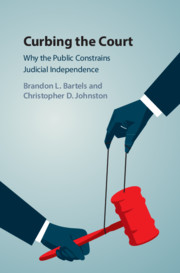Crossref Citations
This Book has been
cited by the following publications. This list is generated based on data provided by Crossref.
BARTELS, BRANDON L.
and
KRAMON, ERIC
2020.
Does Public Support for Judicial Power Depend on Who is in Political Power? Testing a Theory of Partisan Alignment in Africa.
American Political Science Review,
Vol. 114,
Issue. 1,
p.
144.
Read, Katherine
and
Memess, Heather
2020.
Current Awareness.
Legal Information Management,
Vol. 20,
Issue. 4,
p.
231.
Mayrl, Damon
and
Venny, Dahlia
2021.
The dejudicialization of religious freedom?.
Social Compass,
Vol. 68,
Issue. 3,
p.
342.
Woodson, Benjamin W.
and
Parker, Christopher M.
2021.
The Chief Justice versus the iconoclast: Popular constitutionalism and support for using “sociological gobbledygook” in legal decisions.
Law & Society Review,
Vol. 55,
Issue. 4,
p.
657.
Carrington, Nathan T.
and
French, Colin
2021.
One Bad Apple Spoils the Bunch: Kavanaugh and Change in Institutional Support for the Supreme Court.
Social Science Quarterly,
Vol. 102,
Issue. 4,
p.
1484.
Guay, Brian
and
Lopez, Jesse
2021.
Partisan Bias in Bipartisan Places?.
Public Opinion Quarterly,
Vol. 85,
Issue. 1,
p.
161.
Armaly, Miles T
and
Enders, Adam M
2021.
No home court advantage: The trump impeachment trial and attitudes toward the U.S. Supreme Court.
Research & Politics,
Vol. 8,
Issue. 2,
p.
205316802110530.
Leonard, Meghan E.
2022.
New Data on Court Curbing by State Legislatures.
State Politics & Policy Quarterly,
Vol. 22,
Issue. 4,
p.
483.
Boddery, Scott S.
Houck, Aaron M.
and
O’Geen, Andrew J.
2022.
Emerging Hardball Confirmation Tactics and Public Support for the U.S. Supreme Court.
Justice System Journal,
Vol. 43,
Issue. 4,
p.
544.
Gibson, James L.
2022.
Losing Legitimacy: Has Dobbs Undermined Popular Support for the U.S Supreme Court?.
SSRN Electronic Journal ,
Carrington, Nathan T.
and
Sigsworth, Claire
2022.
Home-State Interest, Nationalism, and the Legitimacy of the International Criminal Court.
Law & Social Inquiry,
Vol. 47,
Issue. 2,
p.
449.
Catalano, Michael A.
2022.
Ex Ante and Ex Post Control over Courts in the US States: Court Curbing and Political Party Influence.
Justice System Journal,
Vol. 43,
Issue. 4,
p.
503.
Carrington, Nathan
and
Strother, Logan
2022.
Plugging the Pipe? Evaluating the (Null) Effects of Leaks on Supreme Court Legitimacy.
SSRN Electronic Journal,
Leonard, Meghan E.
2022.
State Supreme Court Responsiveness to Court Curbing: Examining the Use of Judicial Review.
Justice System Journal,
Vol. 43,
Issue. 4,
p.
486.
Jessee, Stephen
Malhotra, Neil
and
Sen, Maya
2022.
A decade-long longitudinal survey shows that the Supreme Court is now much more conservative than the public.
Proceedings of the National Academy of Sciences,
Vol. 119,
Issue. 24,
Bartels, Brandon L.
and
Kramon, Eric
2022.
All the President's Justices? The Impact of Presidential Copartisanship on Supreme Court Job Approval.
American Journal of Political Science,
Vol. 66,
Issue. 1,
p.
171.
Crandall, Erin
and
Lawlor, Andrea
2022.
Public Support for Canadian Courts: Understanding the Roles of Institutional Trust and Partisanship.
Canadian Journal of Law and Society / Revue Canadienne Droit et Société,
Vol. 37,
Issue. 1,
p.
91.
Obeng-Odoom, Franklin
2022.
The Purpose of Constitutional Political Economy.
Challenge,
Vol. 65,
Issue. 3-4,
p.
106.
Bartels, Brandon L.
Horowitz, Jeremy
and
Kramon, Eric
2023.
Can Democratic Principles Protect High Courts from Partisan Backlash? Public Reactions to the Kenyan Supreme Court's Role in the 2017 Election Crisis.
American Journal of Political Science,
Vol. 67,
Issue. 3,
p.
790.
Lawlor, Andrea
and
Crandall, Erin
2023.
The Canadian Charter’s Notwithstanding Clause as an Institutionalized Mechanism of Court Curbing.
American Review of Canadian Studies,
Vol. 53,
Issue. 1,
p.
1.





